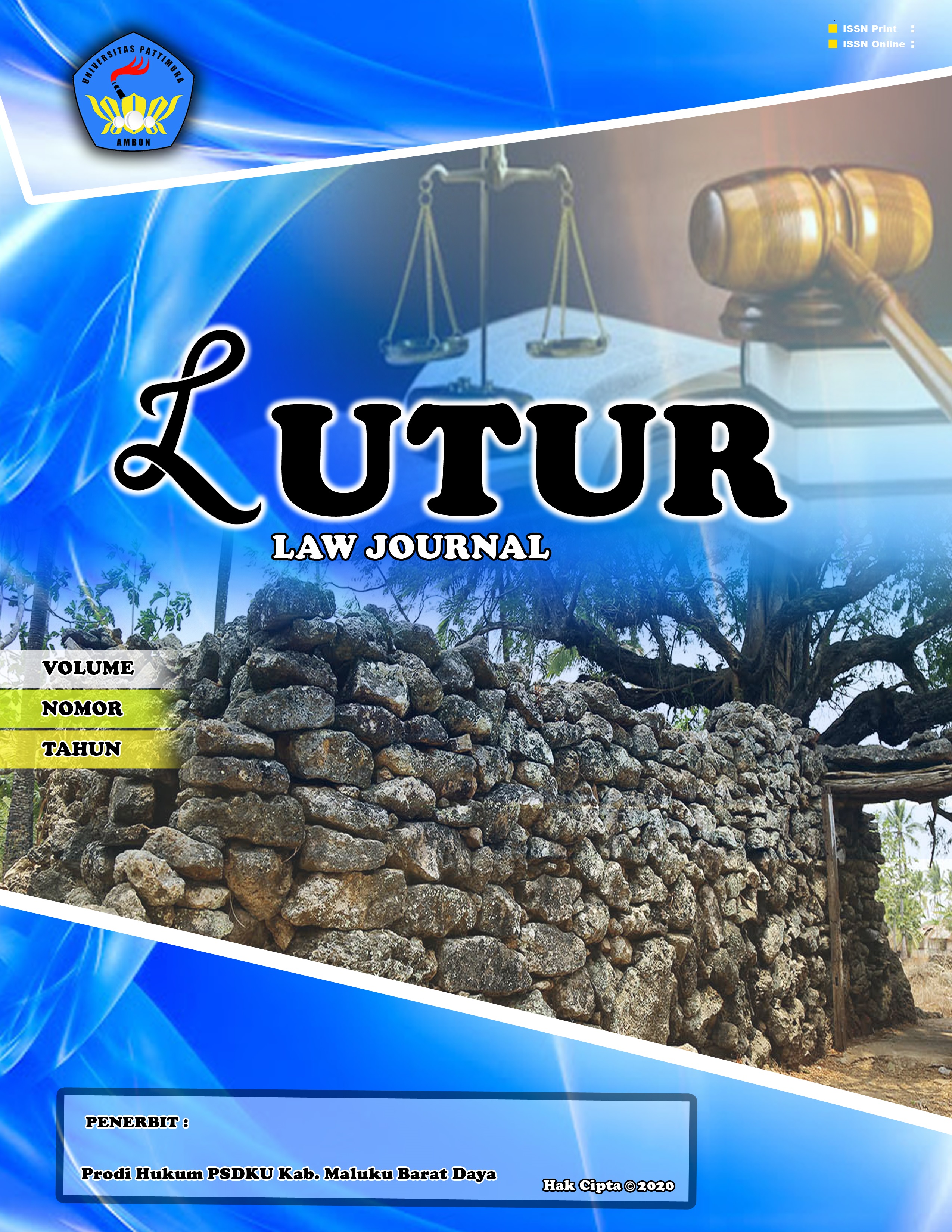Problematika Tambang Ilegal Dalam Perspektif Hukum Pidana Di Indonesia
Abstract
The 1945 Constitution of the Republic of Indonesia states that the earth and water and the natural resources contained therein are controlled by the state and used for the greatest prosperity of the people. The state has the right to manage and control natural resources, which will be used for the prosperity of the people. However, the polemic about the rise of illegal mining carried out by irresponsible individuals, whether carried out traditionally or using heavy equipment, is very disturbing. Law enforcement is one of the steps that can be taken to handle illegal mining cases. The use of criminal legal instruments can be used in law enforcement against illegal mining cases. Mining without a permit violates the criminal provisions of Article 158 of Law Number 3 of 2020 concerning Amendments to Law Number. 4 of 2009 concerning Mineral and Coal Mining. Mining activities have a direct physical impact on the environment, such as loss of resources and environmental damage during the mining process and even after mining is carried out.
Downloads
References
Artikel Jurnal
Fadlian, Aryo. “Pertanggungjawaban Pidana Dalam Suatu Kerangka Teoritis.” Jurnal Hukum Positum 5, no. 2 (2020): 10–19.
Gani, Ruslan Abdul, and Retno Kusuma Wardani. “Pegekan Hukum Terhadap Tambang Minyak Ilegal Di Wilayah Hukum Polda Jambi.” Legalitas: Jurnal Hukum 13, no. 2 (2021). https://doi.org/10.33087/legalitas.v13i2.286.
Ibrahim, Indra. “Dampak Penambangan Timah Ilegal Yang Merusak Ekosistem Di Bangka Belitung.” Jurnal Hukum Dan Bisnis (Selisik) 1, no. 1 (2015): 77–90. http://journal.univpancasila.ac.id/index.php/selisik/article/view/626.
Jefri Anthoni, Hendrich Jut Abert, and Ety Sandora. “Tambang Ilegal Di Kabupaten Kutai Kartanegara Terkait Dengan Undang-Undang Nomor 3 Tahun 2020 Tentang Perubahan Atas Undang-Undang Nomor 4 Tahun2009 Tentang Pertambangan Mineral Dan Batu Bara.” Collegium Studiosum Journal 3, no. 2 (2020): 95–100. https://doi.org/10.56301/csj.v3i2.476.
Kholijah, Siti, and Budi Santoso. “Praktik Tambang Ilegal Ditinjau Dari Maqashid Syariah (Studi Kasus Sungai Kelurahan Tapus).” Jurnal Mabisya 3, no. 1 (2022): 1–24.
Kim, So Woong. “Kebijakan Hukum Pidana Dalam Upaya Penegakan Hukum Lingkungan.” Lingkungan Hidup Dalam Upaya Penegakan Hukum, 2009.
Paruki, Novia Rahmawati A, and Ahmad Ahmad. “Efektivitas Penegakan Hukum Tambang Ilegal.” Batulis Civil Law Review 3, no. 2 (2022). https://doi.org/10.47268/ballrev.v3i2.966.
Buku
Muchtar, Masrudi, Abdul Khair, and Noraida. Hukum Kesehatan Lingkungan (Kajian Teoritis Dan Perkembangan Pemikiran). Yogyakarta: Pustaka Baru, 2016.
Rahardjo, Satjipto. Masalah Penegakan Hukum, Suatu Tinjauan Sosiologis. Bandung: Sinar Baru, 1993.
Santoso, Aris Prio Agus, Rezi, and Aryono. Pengantar Hukum Pidana. Bantul Yogyakarta: Pustaka Baru Press, 2023.
Solikin, Nur. Pengantar Metodologi Penelitian Hukum. Pasuruan, Jawa Timur: CV. Penerbit Qiara Media, 2021.
Sudrajat, Nandang. Teori Dan Praktik Pertambangan Indonesia. Yogyakarta: Medpress Digital, 2013.
Lainnya
Yusrial, M Rizki. “128 Kasus Tambang Ilegal Pada 2023, ESDM Beberkan Langkah Digitalisasi, Formalisasi Izin Hingga Bikin Ditjen Baru.” Tempo.co, 2024. https://www.tempo.co/ekonomi/128-kasus-tambang-ilegal-pada-2023-esdm-beberkan-langkah-digitalisasi-formalisasi-izin-hingga-bikin-ditjen-baru-1167179.
Copyright (c) 2024 Astuti Nur Fadillah (Author)

This work is licensed under a Creative Commons Attribution-NonCommercial 4.0 International License.
Authors who publish their manuscripts in this Journal agree to the following conditions:
- The copyright in each article belongs to the author, as well as the right to patent.
- Authors are able to enter into separate, additional contractual arrangements for the non-exclusive distribution of the journal's published version of the work (e.g., post it to an institutional repository or publish it in a book), with an acknowledgment of its initial publication in this journal.
- Authors are permitted and encouraged to post their work online (e.g., in institutional repositories or on their website) prior to and during the submission process, as it can lead to productive exchanges, as well as earlier and greater citation of published work.
- Authors have the right to self-archiving of the article (Author Self-Archiving Policy)














